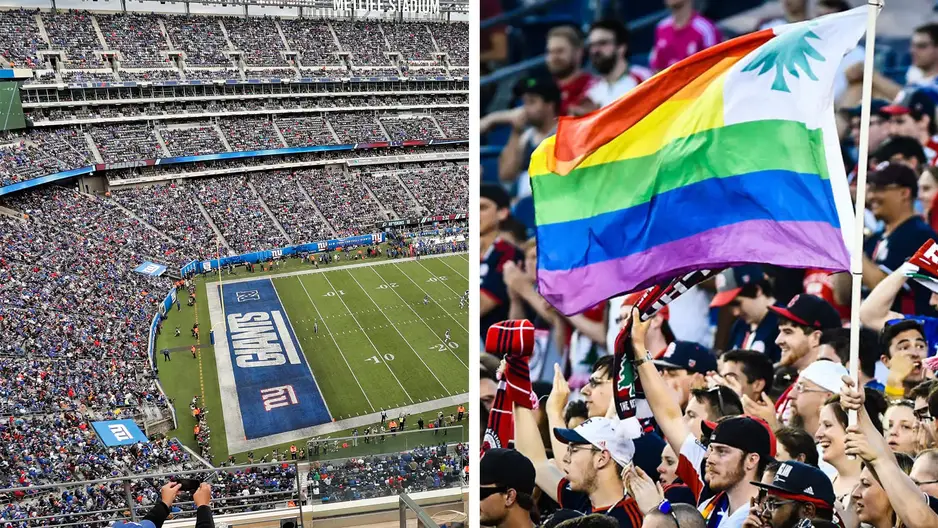
In a move that has sparked widespread controversy and ignited debates across the sports and cultural landscape, Major League Soccer (MLS) has announced a permanent ban on Pride flags during the FIFA Club World Cup 2025. The decision, described by league officials as an effort to maintain a “neutral and unified playing environment,” has left fans, players, and activists sharply divided.
While the league insists the ban is intended to eliminate political and social distractions during the prestigious international tournament, critics are calling it a blatant step backward for inclusion and equality in sports.
The announcement came in a press release from MLS Commissioner Don Garber, who explained that the decision was made after “extensive consultations with FIFA officials, team representatives, and event organizers.” According to Garber, the ban on Pride flags—and potentially other “politically charged” symbols—is aimed at fostering a sense of “unity through neutrality.”
“We want to ensure that the FIFA Club World Cup is a celebration of soccer that transcends political and social boundaries,” Garber stated. “By eliminating symbols that may be perceived as divisive, we hope to create an environment where fans can focus solely on the beauty of the game.”
The ban will apply not only to fans in the stands but also to players, coaches, and other team personnel. Any display of Pride flags or similar symbols during the tournament will reportedly result in fines or other penalties for the offending party.

The backlash was immediate, with LGBTQ+ advocacy groups and allies condemning the move as an act of erasure and an affront to the progress made in making sports more inclusive. “Neutrality has always been the excuse for exclusion,” said Sarah Thompson, a spokesperson for Rainbow Pitch, an organization that advocates for LGBTQ+ rights in soccer. “Banning Pride flags sends a clear message: LGBTQ+ fans and players are not welcome.”
Social media erupted with criticism, with hashtags like #LetTheFlagsFly and #PrideInSports trending within hours of the announcement. “So much for soccer being the world’s game,” one Twitter user wrote. “MLS just told an entire community that their identity is a ‘distraction.’”
Even some players have spoken out against the decision. An anonymous MLS player expressed frustration, saying, “We’re told to bring our authentic selves to the field, but now we’re being told to hide those selves in the stands. It’s hypocritical and hurtful.”
Despite the uproar, there is a segment of fans and commentators who have come out in support of the ban, arguing that sports should remain apolitical. “The Pride flag, like any other flag that represents a cause, can be divisive,” said Marcus O’Connor, a sports analyst known for his traditionalist views. “Fans come to the games to cheer for their teams, not to engage in political debates.”
Others see the ban as an effort to preempt potential controversies and conflicts that could arise during the high-stakes tournament. “FIFA events draw fans from all over the world, including countries with vastly different cultural norms,” said one supporter. “This isn’t about targeting one group—it’s about avoiding chaos.”
This isn’t the first time MLS and FIFA have faced criticism over their handling of LGBTQ+ issues. The World Cup in Qatar brought global attention to FIFA’s struggles with inclusion, as fans and players were restricted from displaying Pride flags or wearing rainbow armbands in a country with strict anti-LGBTQ+ laws. While the 2025 tournament will be hosted in a more inclusive location, the echoes of Qatar’s controversies remain fresh in many minds.
Critics argue that the MLS decision is particularly disappointing given the league’s previous efforts to support LGBTQ+ initiatives, such as Pride Nights and partnerships with advocacy organizations. “This is a betrayal,” said a spokesperson for Pride FC, a fan group dedicated to supporting LGBTQ+ soccer fans. “MLS can’t celebrate Pride one day and ban it the next.”
Some analysts predict that the ban could have financial repercussions, particularly if LGBTQ+ fans and their allies choose to boycott games or merchandise. “Soccer fandom is about passion and community,” said a marketing expert. “If you alienate a portion of that community, you’re not just losing ticket sales—you’re losing the soul of the sport.”
Others argue that MLS is underestimating the backlash from international audiences. “This isn’t just an American issue,” said a European soccer journalist. “Fans worldwide are watching, and this decision could tarnish the tournament’s reputation.”
The controversy has also sparked debates about the role of symbolism in sports. Should flags, armbands, and other displays be welcomed as expressions of identity and support? Or do they detract from the “purity” of the game?
One commentator summed up the debate: “Soccer is inherently political. Every anthem, every flag, every national jersey carries a message. To pretend otherwise is to ignore the very nature of the sport.”
As the FIFA Club World Cup 2025 approaches, the pressure on MLS and FIFA is unlikely to subside. LGBTQ+ advocacy groups are already organizing protests and calling for boycotts, while fans are petitioning for the ban to be reversed.
Some speculate that the decision could lead to unexpected acts of defiance during the tournament. “You can ban flags, but you can’t ban people’s beliefs,” said one activist. “If anything, this decision will inspire more creativity in how fans show their Pride.”
For now, MLS stands by its decision, insisting that the ban is about unity, not exclusion. But as the controversy continues to brew, it’s clear that this issue is far from settled.
As MLS navigates the fallout from its Pride flag ban, one thing is certain: the intersection of sports and social issues isn’t going away. Whether the league’s decision is remembered as a step toward neutrality or a misstep in inclusivity remains to be seen. For fans, players, and advocates, the debate over what belongs on the field—and in the stands—is just beginning.